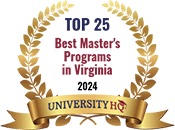
M.Ed. in Reading Specialist (without Endorsement)
Prepare to Unlock a Child’s Potential Through a Reading Specialist Degree
The gift of reading opens up possibilities not yet imagined. Regent’s Master of Education (M.Ed.) in Reading Specialist without an endorsement is designed for those who want to accomplish a master’s degree but do not want to add an endorsement to their license. In this program, you can gain a balanced perspective on teaching reading so that you will be prepared in the areas of supervision, communication skills, technology, reading assessment, instruction, curriculum, and research.
HONE YOUR READING SPECIALIST SKILLS
Be better equipped to teach reading to students.
WIDEN YOUR JOB PROSPECTS
Enjoy rewarding opportunities in schools and communities.
ENHANCE JOB SATISFACTION
Fulfilling your calling to teach reading is an added reward.
ALIGN YOURSELF WITH EXCELLENCE
Experience Regent ranked among top national universities by U.S. News & World Report for four years (2019, 2020, 2022 and 2023). Its programs have also been recognized among the top 10 online graduate education programs in Virginia for 11 consecutive years. Regent graduates are empowered to make a difference in lives, which has led to more than 900 alumni being recognized as Teachers of the Year in Hampton Roads since 2004.
Presented from a Christian worldview, the M.Ed. in Reading Specialist degree is supported by award-winning faculty in Virginia Beach.
Please complete the Request Information form on this page to learn more about this program.
On completing the M.Ed. – Reading Specialist degree without endorsement, you can:
- Develop reading instruction using technology and data-driven assessment tools.
- Assess and teach reading of narrative and expository texts.
- Understand data and research methods to improve student learning and program effectiveness.
Career Opportunities
- Public & Private Teachers
- Homeschool Teachers
- Reading Tutoring
2024-25 Semester Check-In Deadlines
All students are expected to check-in for the semester two weeks before the session start date. Students should apply, be accepted, enroll in their first courses, and confirm a plan to pay for their courses prior to this date.
| Session | Semester Check-In | Session Start Date |
|---|---|---|
| Session A | Friday, August 9 | Monday, August 19 |
| Session M | Friday, September 6 | Monday, September 16 |
| Session B | Friday, October 11 | Monday, October 21 |
| Session C | Wednesday, January 8 | Monday, January 13 |
| Session T | Friday, January 31 | Monday, February 10 |
| Session D | Friday, March 7 | Monday, March 17 |
| Session E | Friday, May 2 | Monday, May 12 |
| Session F | Friday, June 13 | Monday, June 23 |
Admissions Requirements
Step 1: Apply to Regent University
Submit your application using the Regent University Online Application.
Note: If you are unable to complete our application due to a disability, please contact our Admissions Office at 757.352.4990 or admissions@regent.edu and an admissions representative will provide reasonable accommodations to assist you in completing the application.
Step 2: Submit Your Unofficial Transcripts
Submit your unofficial transcripts to regent.edu/items.
Upon submitting your application, you will receive an email requesting authorization for Regent University to obtain your official transcripts from your U.S. degree-granting institution. International transcripts must be evaluated by a NACES, AACRAO or NAFSA approved agency.
Step 3: Submit Your Government-Issued ID
To ensure academic integrity, Regent University requires a copy of a government-issued ID. Please submit a scanned copy or photograph of it to regent.edu/items.
Please feel free to contact the Office of Admissions at 757.352.4990 or admissions@regent.edu should you have any further questions about the application process.
Note: All items submitted as part of the application process become the property of Regent University and cannot be returned.
PART-TIME STUDENTS
| Degree | Tuition Cost Per Credit Hour | Average Credit Hours Per Semester | Average Tuition Per Semester |
|---|---|---|---|
| Master of Education (M.Ed.) | $565 | 6 | $3,390 |
| Educational Specialist (Ed.S.) | $800 | 6 | $4,800 |
| Doctor of Education (Ed.D.) | $800 | 3 | $2,400 |
| Doctor of Philosophy (Ph.D.) | $800 | 3 | $2,400 |
Full-Time Students
| Degree | Tuition Cost Per Credit Hour | Average Credit Hours Per Semester | Average Tuition Per Semester |
|---|---|---|---|
| Master of Education (M.Ed.) | $565 | 9 | $5,085 |
| Educational Specialist (Ed.S.) | $800 | 9 | $7,200 |
| Doctor of Education (Ed.D.) | $800 | 6 | $4,800 |
| Doctor of Philosophy (Ph.D.) | $800 | 6 | $4,800 |
Student Fees Per Semester
| University Services Fee (On-Campus Students) | $850 (Fall & Spring) $700 (Summer) |
| University Services Fee (Online Students) | $700 |
Part-Time Students
| Degree | Tuition Cost Per Credit Hour | Average Credit Hours Per Semester | Average Tuition Per Semester |
|---|---|---|---|
| Master of Education (M.Ed.) | $565 | 6 | $3,390 |
| Educational Specialist (Ed.S.) | $800 | 6 | $4,800 |
| Doctor of Education (Ed.D.) | $800 | 3 | $2,400 |
| Doctor of Philosophy (Ph.D.) | $800 | 3 | $2,400 |
Full-Time Students
| Degree | Tuition Cost Per Credit Hour | Average Credit Hours Per Semester | Average Tuition Per Semester |
|---|---|---|---|
| Master of Education (M.Ed.) | $565 | 9 | $5,085 |
| Educational Specialist (Ed.S.) | $800 | 9 | $7,200 |
| Doctor of Education (Ed.D.) | $800 | 6 | $4,800 |
| Doctor of Philosophy (Ph.D.) | $800 | 6 | $4,800 |
Student Fees Per Semester
| University Services Fee (On-Campus Students) | $850 (Fall & Spring) $700 (Summer) |
| University Services Fee (Online Students) | $700 |
*Rates are subject to change at any time.


